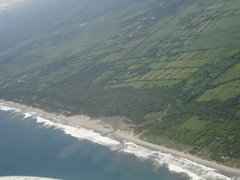 When our time was up at Costa del Sol, we were more than ready to move on. We needed a break from our break.
When our time was up at Costa del Sol, we were more than ready to move on. We needed a break from our break.Sure, the beach area is nice. But we felt isolated from the very thing we came here to find in the first place. I started to feel guilty just for being here.
Before we left, we noticed a boy who parked his bicycle on the beach and began walking toward us. He had trinkets to sell, and quickly zeroed in on my dear wife.
 I'm not sure if Michele actually liked the stuff he was slinging, or if she just felt like giving him a break. But she took the bait and bought a couple of bracelets.
I'm not sure if Michele actually liked the stuff he was slinging, or if she just felt like giving him a break. But she took the bait and bought a couple of bracelets.This would be the one and only time we were ever approached like this at Costa del Sol. You're much more likely to be mobbed with hucksters in places like Cancun or Costa Rica. But El Salvador remains mostly unspoiled by the ugly engines of consumerist, ticky-tacky tourism. The daiquiri-swilling gringos have not yet arrived here in masses.
But I can tell it's just a matter of time. This country - the land, the coast - is too beautiful, too breathtaking. I'm a real estate agent, and I see too many broken-down shacks here that offer exactly the same jaw-dropping views that fetch millions in California or far west Austin.
 El Salvador, I am told, has changed tremendously since its civil war ended a dozen or so years ago. But it looks to me like the changes are just beginning.
El Salvador, I am told, has changed tremendously since its civil war ended a dozen or so years ago. But it looks to me like the changes are just beginning.There will be a bright future here, for a few. And yet I'm certain the inevitable boom in El Salvador tourism and real estate will be of little benefit to the vast majority of its people. That's how things have always worked here.
When it came to the quite fascinating subject of El Salvador, I was a typically clueless American up until a few months ago. I couldn't have even found this country on a map. But as we planned our trip, I started reading up.
Today, I know much more. Maybe too much.
Horrible things happened here more than two decades ago, and I'm sad to say U.S. fingerprints are all over it.
There I was in a Louisiana classroom those many years ago, innocently learning the alphabet and trying not to wet my pants, blissfully unaware that El Salvador's poor and their church leaders were starting to organize against an oppressive system of feudalism.
While my top concern was whether Momma would be willing to spring for an Atari, Ronald Regan was gravely warning the grown-ups that evil communism was on the march in El Salvador. He - that is, we - spent millions of our tax dollars on guns and bullets to help the Salvadoran government's military kill its own people.
Before the war was over, over 80,000 civilians would die.
 Even today, Uncle Sam still pulls the strings here, imposing his will on Salvadoran elections to ensure the ruling ARENA party continues its dominance.
Even today, Uncle Sam still pulls the strings here, imposing his will on Salvadoran elections to ensure the ruling ARENA party continues its dominance. The people of El Salvador can't control who's in charge of U.S. policy, yet so many of those decisions have a bigger direct impact on their lives than on our own. In this context, it seems particulary cruel that most of us who can vote don't bother. Very few are even paying attention.
Back on the beach, the kid with the trinkets lucked out again. Another woman at our hotel wanted a few necklaces, but was low on cash. She asked the kid to follow her to her table at the resort so she could grab her purse.
Walking together, they approached the line between the beach's sand and the resort's rear entrance. The kid came right up to the threshold, and then abruptly stopped.
The woman looked back at the boy and waved her arm, signaling him to keep following her.
"Come over here," she told him, still waving her hand inwardly. "My table's right here."
Nervously glancing over at the rifle-toting hotel guard, the boy didn't budge an inch. He knew the rules.
In this corner of Central America, there is a clear, bright line in the sand between the haves and have-nots. That line is much clearer, much bigger and much wider than in the United States.
There's a good reason why the wealthy few invest in thick exterior walls topped with razor wire and hire guards armed with assault rifles. In the pursuit of economic prosperity, the vast majority of people in El Salvador are just like that boy on the beach who sells trinkets from his bicycle: They are stuck in a system that perpeptually keeps them on the outside, looking in.





No comments:
Post a Comment